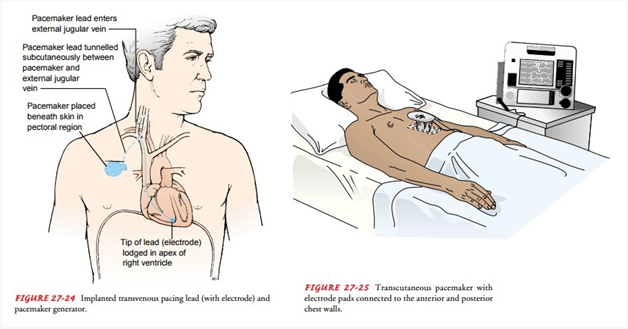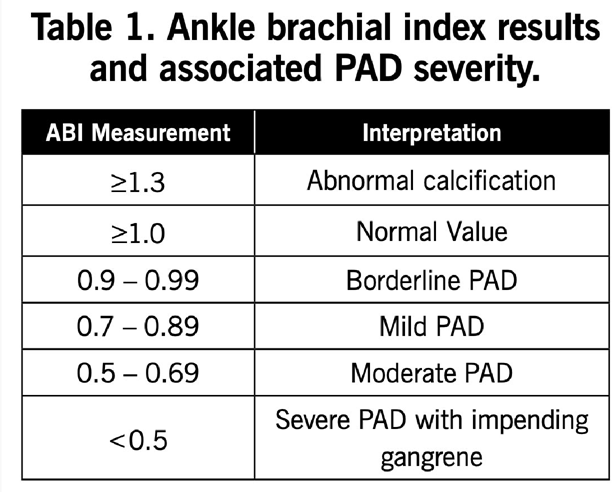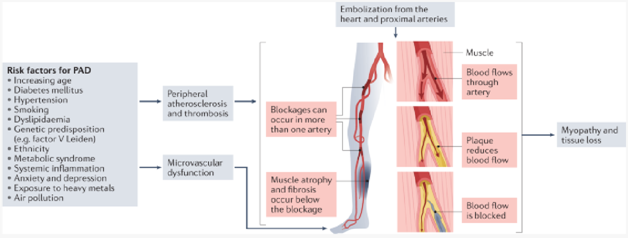The nurse is caring for a client with sinus bradycardia at a rate of 32 beats/min, blood pressure (BP) of 80/42 mm Hg, and reports feeling faint. Which is the appropriate action?
Give the scheduled dose of diltiazem (Cardizem).
Reposition the patient on the left side.
Have the patient perform the Valsalva maneuver.
Apply the transcutaneous pacemaker (TCP) pads
The Correct Answer is D
Sinus bradycardia with a heart rate of 32 beats/min and accompanying hypotension and symptoms of feeling faint indicates significant hemodynamic compromise. In such cases, the first-line intervention is to provide external cardiac pacing through transcutaneous pacemaker (TCP) pads. TCP can help increase the heart rate and improve cardiac output by delivering electrical impulses to the heart.
Administering the scheduled dose of diltiazem (Cardizem), a calcium channel blocker, is not appropriate in this situation. Diltiazem can further lower the heart rate and blood pressure, exacerbating the client's symptoms and potentially leading to adverse effects.
Repositioning the patient on the left side or having the patient perform the Valsalva maneuver are not effective interventions for treating sinus bradycardia with hemodynamic compromise. These actions may be used in specific situations, but in this case, the client requires immediate intervention to address the low heart rate and blood pressure.

Nursing Test Bank
Naxlex Comprehensive Predictor Exams
Related Questions
Correct Answer is B
Explanation
The nurse should best follow up the assessment finding of an ankle-brachial index (ABI) of 0.40 in the right leg by implementing interventions relevant to arterial narrowing.
An ankle-brachial index is a non-invasive test used to assess peripheral arterial disease (PAD). An ABI value below 0.90 indicates significant arterial narrowing and impaired blood flow to the lower extremities. An ABI of 0.40 suggests severe arterial narrowing, which puts the client at risk for reduced perfusion and potential complications such as tissue ischemia, ulceration, and gangrene.
Implementing interventions relevant to arterial narrowing is crucial in this case. These interventions may include:
- Collaborating with the healthcare provider to develop a treatment plan: This may involve prescribing medications to improve blood flow, such as antiplatelet agents or vasodilators.
- Encouraging lifestyle modifications: This can include smoking cessation, regular exercise, and maintaining a healthy diet low in saturated fats and high in fruits and vegetables.
- Promoting optimal cardiovascular health: This can involve managing other risk factors for arterial narrowing, such as hypertension, diabetes, and high cholesterol levels.
- Educating the client about the signs and symptoms of PAD: This includes teaching them to monitor for changes in skin color, temperature, and sensation in the affected limb, as well as the importance of seeking prompt medical attention if these changes occur.

Let's review the other options:
Assessing the client's use of over-the-counter dietary supplements: While it is important to assess for potential interactions between medications and dietary supplements, this would not be the immediate follow-up action for a severely reduced ABI.
Encouraging the client to increase intake of foods high in vitamin K: While maintaining a balanced diet is important for overall health, increasing vitamin K intake is not specifically indicated for addressing arterial narrowing or improving the ABI.
Adjusting the client's activity level to accommodate decreased coronary output:
Coronary output refers to blood flow to the heart muscle. Arterial narrowing in the leg does not directly affect coronary output. However, it is important to encourage appropriate physical activity for the client based on their overall cardiovascular health and exercise tolerance.
Correct Answer is B
Explanation
The most appropriate intervention for a client diagnosed with peripheral arterial insufficiency is: Encourage the client to engage in a moderate amount of exercise. Peripheral arterial insufficiency is a condition characterized by reduced blood flow to the extremities, typically the legs, due to narrowed or blocked arteries. Regular exercise is an important component of managing peripheral arterial insufficiency. Exercise helps improve circulation, promote collateral blood vessel development, and increase the distance a client can walk before experiencing pain (intermittent claudication). Therefore, encouraging the client to engage in a moderate amount of exercise, such as walking, under healthcare provider guidance is crucial.]

The other options are not appropriate interventions for peripheral arterial insufficiency:
Elevating the legs and arms above the heart when resting: While elevation can be beneficial for certain conditions, such as reducing swelling in venous insufficiency, it is not the primary intervention for peripheral arterial insufficiency. Elevation alone does not improve arterial blood flow and may not effectively address the underlying circulatory issues.
Encouraging extended periods of sitting or standing: Prolonged sitting or standing can further restrict blood flow and exacerbate symptoms in clients with peripheral arterial insufficiency. Encouraging regular movement and avoiding prolonged immobility is important to maintain adequate circulation.
Discouraging walking in order to limit pain: While walking may cause pain or discomfort in clients with peripheral arterial insufficiency (intermittent claudication), it is important to encourage walking as part of an exercise regimen. Walking helps improve symptoms over time and promotes overall cardiovascular health.
Whether you are a student looking to ace your exams or a practicing nurse seeking to enhance your expertise , our nursing education contents will empower you with the confidence and competence to make a difference in the lives of patients and become a respected leader in the healthcare field.
Visit Naxlex, invest in your future and unlock endless possibilities with our unparalleled nursing education contents today
Report Wrong Answer on the Current Question
Do you disagree with the answer? If yes, what is your expected answer? Explain.
Kindly be descriptive with the issue you are facing.
